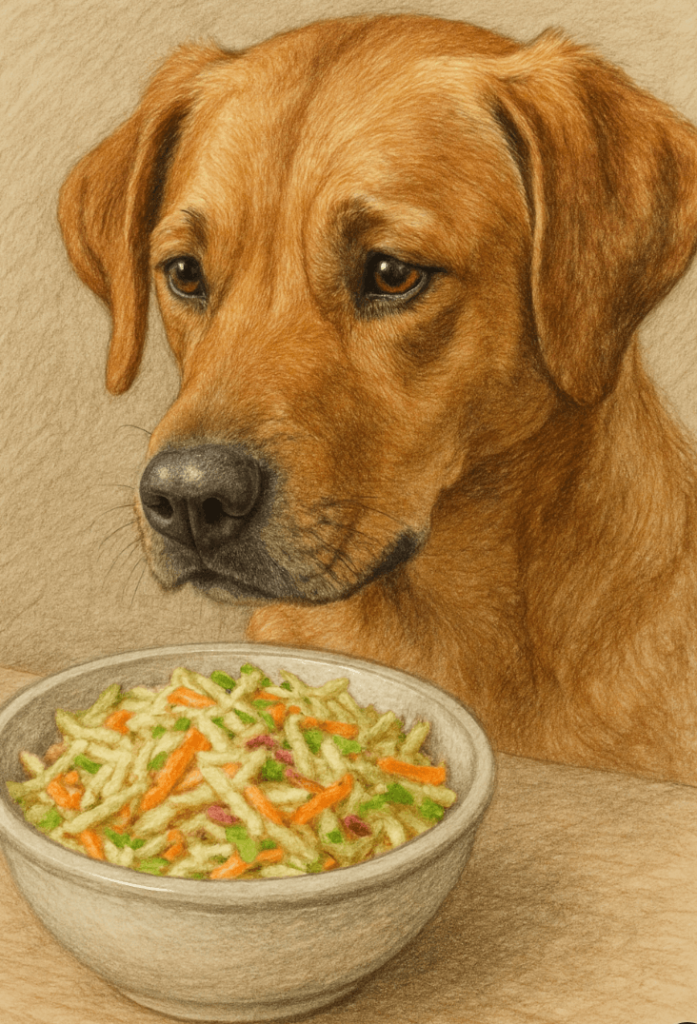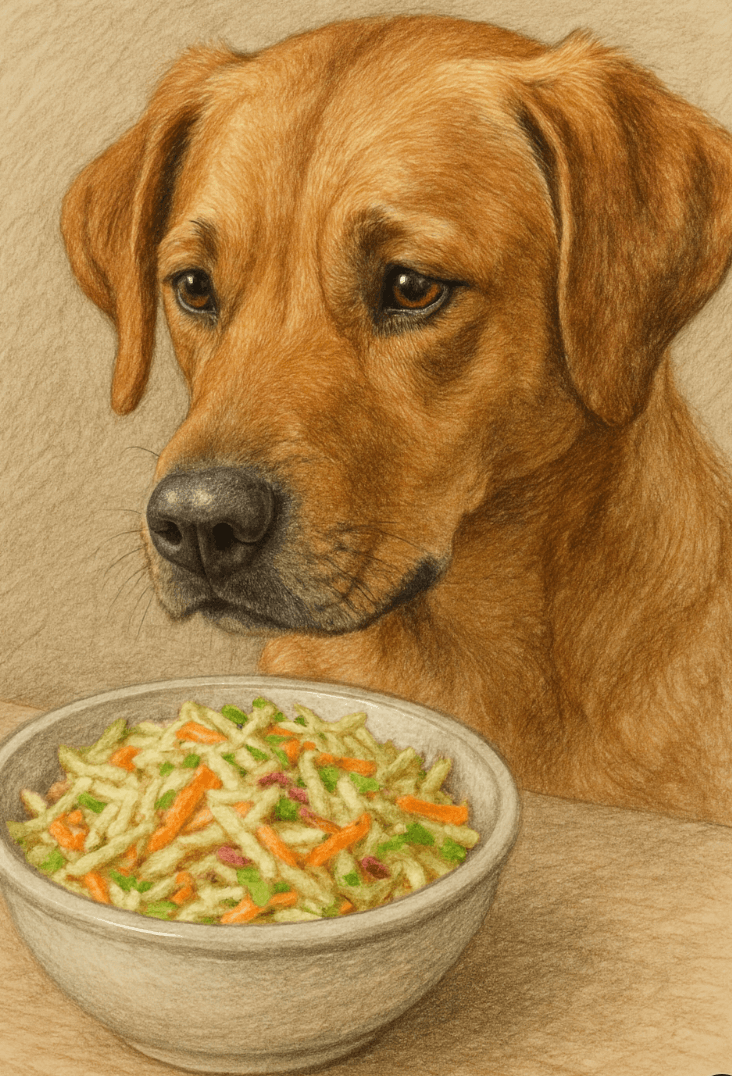Can Dogs Eat Coleslaw? What You Need to Know
Coleslaw is a refreshing and crunchy side dish that many people enjoy at barbecues, picnics, and family gatherings. But can dogs eat coleslaw too? While some ingredients in coleslaw are safe for dogs in moderation, others can be harmful or even toxic. Understanding what makes up this popular dish and how it affects your furry friend is essential before sharing it with them. In this blog post, we’ll explore the risks and benefits of feeding coleslaw to dogs, break down its components, and provide safer alternatives to keep your pup happy and healthy.
Key Ingredients in Coleslaw and Their Effects on Dogs
Before deciding whether coleslaw is safe for your dog, it’s important to examine its individual ingredients and how they impact canine health. Here’s a breakdown of common coleslaw components and their potential effects.
Cabbage:
Cabbage is generally safe for dogs in small amounts and can even aid digestion due to its fiber content. However, too much may cause gas or bloating.Carrots:
Carrots are a healthy, low-calorie snack for dogs, rich in vitamins A and K. They’re safe as long as they’re cut into bite-sized pieces to prevent choking.Onions:
Onions are highly toxic to dogs and can damage red blood cells, leading to anemia. Even small amounts should be avoided.Mayonnaise:
Mayonnaise is high in fat and calories, which can upset your dog’s stomach or contribute to obesity if consumed regularly.Vinegar:
Vinegar is acidic and can irritate a dog’s digestive system, especially if consumed in large quantities.
Understanding these ingredients helps you determine whether coleslaw is appropriate for your dog or if modifications are needed.
Potential Risks of Feeding Coleslaw to Dogs
While coleslaw might seem harmless, certain risks make it unsuitable for dogs in its traditional form. Being aware of these dangers ensures your pet stays safe.
Toxic Ingredients Like Onions and Garlic:
These common coleslaw additives are toxic to dogs and can lead to serious health issues if ingested.High Fat Content from Dressings:
The creamy dressings used in coleslaw are often high in fat, which can cause pancreatitis or gastrointestinal upset.Choking Hazards from Large Pieces:
Large chunks of cabbage or carrots can pose a choking risk, especially for smaller breeds.Allergic Reactions:
Some dogs may have sensitivities to specific ingredients, such as dairy in mayonnaise-based dressings.Digestive Upset from Spices:
Seasonings like pepper or mustard seeds can irritate your dog’s stomach and lead to vomiting or diarrhea.
These risks highlight why coleslaw should be approached with caution when considering it as a treat for your dog.
Check this guide 👉Can Dogs Eat Kimchi? Best 7 Expert Tips!
Check this guide 👉Can Dogs Eat Passionfruit? Best 7 Expert Tips!
Check this guide 👉Can Dogs Eat Chayote? Best 7 Expert Tips!

Safe Ingredients in Coleslaw | Harmful Ingredients in Coleslaw |
|---|---|
Cabbage (in moderation) | Onions |
Carrots (chopped small) | Garlic |
Plain yogurt (as a dressing swap) | Mayonnaise (high-fat) |
Apple cider vinegar (tiny amount) | Spices/seasonings |
Boiled chicken (optional add-in) | Artificial sweeteners (e.g., xylitol) |
How to Make Dog-Friendly Coleslaw at Home
If you’d like to share a coleslaw-inspired treat with your dog, you can create a version tailored to their dietary needs. Follow these tips to ensure it’s safe and nutritious.
Use Plain Cabbage and Carrots:
Stick to plain, shredded cabbage and finely chopped carrots as the base ingredients.Skip Harmful Additives:
Avoid onions, garlic, spices, and artificial sweeteners entirely to prevent toxicity.Replace Creamy Dressings:
Swap mayonnaise for plain Greek yogurt or a drizzle of olive oil for a healthier option.Add Lean Protein (Optional):
Include boiled, unseasoned chicken or turkey for extra flavor and nutrition.Serve in Small Portions:
Offer only a small serving as a treat, ensuring it doesn’t exceed 10% of your dog’s daily caloric intake.
With these adjustments, you can create a dog-friendly coleslaw that’s both tasty and safe.
Signs Your Dog May Have Eaten Unsafe Coleslaw
If your dog accidentally consumes traditional coleslaw containing harmful ingredients, watch for these signs of distress. Acting quickly can prevent complications.
Vomiting or Diarrhea:
These are common symptoms of digestive upset caused by fatty or spicy foods.Lethargy or Weakness:
Toxic ingredients like onions can cause weakness due to red blood cell damage.Loss of Appetite:
Refusal to eat may indicate discomfort or illness after consuming unsafe food.Excessive Drooling:
Drooling can signal nausea or irritation from acidic dressings or spices.Difficulty Breathing:
Severe allergic reactions or toxicity may lead to respiratory distress—seek emergency care immediately.
Recognizing these symptoms early allows you to take prompt action and protect your dog’s health.
Common Mistakes to Avoid When Feeding Coleslaw to Dogs
Feeding coleslaw to dogs requires careful consideration to avoid mistakes that could endanger their health. Here are some pitfalls to watch out for.
Including Onions or Garlic:
These ingredients are toxic to dogs and should never be included in their food.Using High-Fat Dressings:
Creamy dressings can upset your dog’s stomach and contribute to weight gain.Overfeeding Vegetables:
Too much cabbage or carrots can cause gas, bloating, or digestive discomfort.Ignoring Portion Sizes:
Feeding large amounts of coleslaw can disrupt your dog’s balanced diet and lead to obesity.Adding Spices or Seasonings:
Salt, pepper, or other seasonings can irritate your dog’s stomach and should be avoided.
Avoiding these mistakes ensures a safer and healthier experience for your dog.
Healthier Alternatives to Coleslaw for Dogs
If coleslaw seems too risky or complicated, there are plenty of healthier alternatives that mimic its appeal while keeping your dog safe.
Steamed Vegetables:
Offer steamed broccoli, green beans, or zucchini as a nutritious and easy-to-digest snack.Fruit-Based Salads:
Create a fruit salad with apples, blueberries, and bananas for a sweet and hydrating treat.Plain Yogurt Bowls:
Mix plain yogurt with chopped veggies or fruits for a creamy, dog-friendly dish.Homemade Veggie Chips:
Bake thinly sliced carrots or sweet potatoes for a crunchy alternative to coleslaw.Lean Meat and Veggies Mix:
Combine boiled chicken or turkey with finely chopped cabbage or carrots for a protein-packed meal.
These alternatives allow you to cater to your dog’s taste buds while prioritizing their health.
Understanding Your Dog’s Nutritional Needs
Dogs have unique nutritional requirements that differ from humans, so it’s important to tailor their diet accordingly. Here’s what you need to know about feeding your dog safely.
Focus on Balanced Nutrition:
Ensure your dog’s diet includes proteins, fats, carbohydrates, vitamins, and minerals in appropriate proportions.Limit Human Food Treats:
While occasional treats are fine, human food shouldn’t exceed 10% of your dog’s daily caloric intake.Monitor Allergies and Sensitivities:
Some dogs may react negatively to certain foods, so introduce new items gradually and observe their response.Avoid Toxic Foods:
Familiarize yourself with foods that are toxic to dogs, such as chocolate, grapes, and onions, to prevent accidental poisoning.Consult Your Veterinarian:
Always seek professional advice before making significant changes to your dog’s diet or introducing new foods.
By understanding your dog’s needs, you can provide a diet that supports their overall health and happiness.
Frequently Asked Questions About Dogs and Coleslaw
Is store-bought coleslaw safe for dogs?
No, most store-bought coleslaw contains harmful ingredients like onions, garlic, or high-fat dressings. Always check the label carefully.
Can I give my dog plain cabbage instead?
Yes, plain cabbage is safe in moderation but should be introduced gradually to avoid gas or bloating.
What should I do if my dog eats onion-containing coleslaw?
Contact your veterinarian immediately, as onions are toxic and can cause serious health issues.
Are there any health benefits to feeding dogs coleslaw?
Certain ingredients like cabbage and carrots offer vitamins and fiber, but they must be prepared without harmful additives.
How much coleslaw can I safely feed my dog?
Limit treats to no more than 10% of your dog’s daily caloric intake to maintain a balanced diet.
Prioritizing Your Dog’s Health When It Comes to Coleslaw
While coleslaw isn’t inherently toxic to dogs, its traditional preparation often includes ingredients that can harm your furry friend. By understanding what’s safe and what’s not, you can make better choices about sharing human food with your pet. Whether you opt for a dog-friendly version or skip coleslaw altogether, always prioritize your dog’s well-being over convenience. With a little creativity and caution, you can ensure your pup enjoys delicious treats without compromising their health.
Do Cats Have Taste Buds? Best 7 Expert Tips! – Discover how cats experience flavors and why their taste is so unique.
Do Dogs Have Taste Buds? Best 7 Expert Tips! – Discover how dogs experience taste, their preferences, and what it means for their diet and health.
Can Cats Taste Sweet? Best 7 Expert Tips! – Discover why cats can’t taste sweetness, how it affects their diet, and tips to keep them healthy and happy.
Can Dogs Taste Sweet? Best 7 Expert Tips! – Discover how dogs perceive sweetness, which foods are safe, and tips to manage their sweet cravings responsibly.





